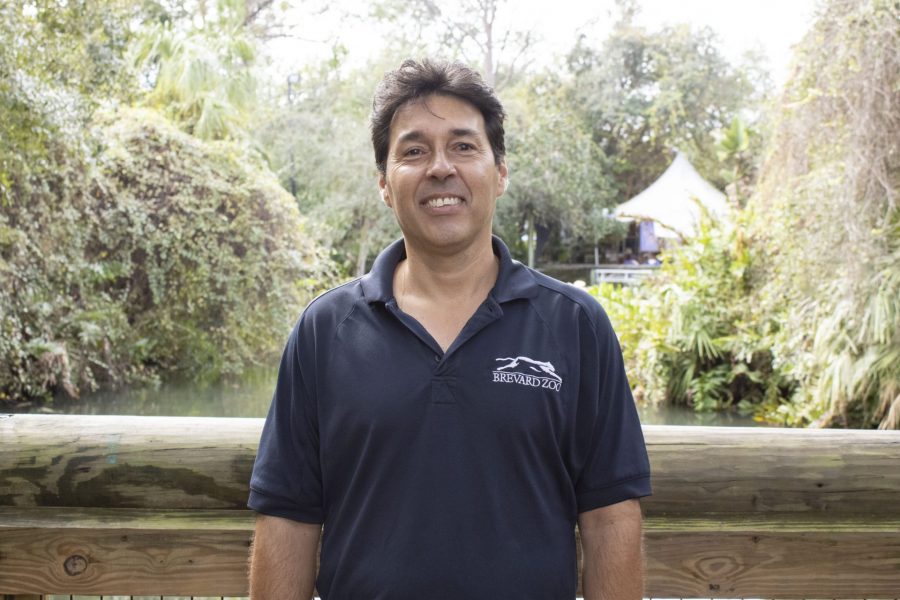

Luis Carrillo, an amphibian conservation planner, is partnering with Brevard Zoo.
Luis Carrillo remembers feeling called to do something more when working as a zoo veterinarian. Throughout his years of work at zoos in Latin American countries, he hoped these facilities would do more to impact wildlife conservation.
So, he decided to take a stand himself.
“I knew I could apply what I learned as a veterinarian and work with wild animals,” Luis said.
This decision has led Luis to establish himself as a conservation planner, particularly with amphibians. He brings this experience and knowledge to our Zoo, which he plans to use as a “home zoo” while he works to encourage action and awareness of the extinction crisis facing amphibians.
20 Years of Helping Animals
Luis brings years of field experience to Brevard Zoo. He has tracked mountain lions in north of Mexico, rescued manatees in Colombia, and worked to help trafficked cotton-top tamarins in Colombia as well.
One of the more notable experiences for Luis was searching for the crested toad, which was believed to be extinct in its natural habitat in Mexico. Initially he and his team only found tadpoles during their first trip to the toad’s natural range until in a month-long trip a crested toad literally hopped into their campsite one evening.
This led the group to eventually track the toads to the nearby river. They had already in place a permit and a grant from the Amphibian Ark (AArk), a nonprofit working to help endangered amphibian species, to collect and start breeding this frog.
That was just the start of Luis’ relationship with Amphibian Ark. After hearing the then-director of Amphibian Ark speak at a meeting, Luis again felt that call to do more in conservation – this time specifically for amphibians.
“These little creatures need help,” Luis said.
The Amphibian Extinction Crisis
One-third to one-half of all amphibian species are threatened with extinction due to a variety of causes such as habitat loss, pollution, disease and climate change.
AArk focuses on moving the critically endangered species that can’t be safeguarded in the wild to zoos, aquariums, universities and other facilities. The goal is to reestablish these species in the wild after the issues endangering them are addressed.
While most zoos focus on the conservation of more widely known animals, Luis and AArk are encouraging and helping facilities to understand the benefits of housing and breeding amphibians.
“You need less money, less space, and you’ll have more of an impact on conservation,” Luis said.
Despite being one of the largest families of vertebrates, amphibians are one of the least represented in zoos, Luis said.
“There is this big knowledge gap on amphibians worldwide,” he said.
That’s where Amphibian Ark’s trainings come in. Keepers and curators can learn amphibian husbandry techniques, veterinary care, small population management to prevent inbreeding, and more.
Luis’ Goals
Luis has quite the list of goals while at Brevard Zoo. His “to-do list” spans everything from helping our veterinary staff complete a comprehensive book on amphibian husbandry, medicine and conservation to helping our conservation department on their proposed support to Latin America conservation organizations.
While at Brevard Zoo, Luis also hopes to bring more amphibian husbandry training programs to Florida zoos. He wants to engage more Florida zoos and wildlife organizations in native amphibian conservation.
Amphibians such as the frosted and reticulated flatwoods salamanders, gopher frog and striped newt need help, he said – possibly through in-house conservation breeding programs in zoos.
“We need to do something,” Luis said. “Having them listed as endangered or vulnerable species is not enough.”
Those who work with wildlife, like biologists, veterinarians and zookeepers, are all part of the “conservation ecosystem,” Luis said. More training and knowledge of amphibian husbandry and conservation only benefits this imperiled species.
“We are all working on different pieces of the puzzle for amphibians,” Luis said. “The more pieces you work on, the faster you complete the puzzle.”
Brevard Zoo is an independent, not-for-profit organization that receives no recurring government funding for our operating costs. Your generous support enables us to continue to serve our community and continue our vital animal wellness, education and conservation programs.